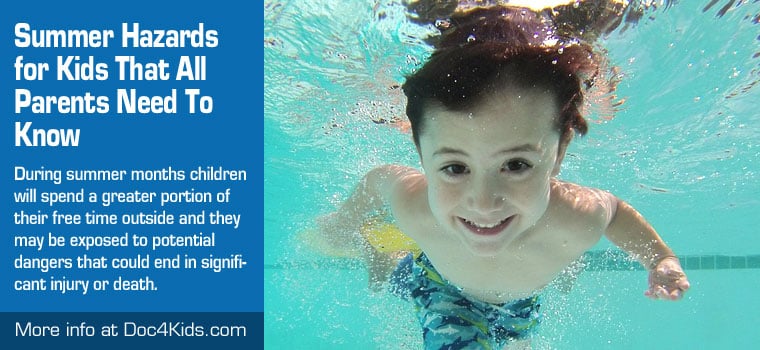Summer Hazards for Kids That All Parents Need To Know
Now that the summer months have arrived, children will tend to spend a greater portion of their free time outside and they may be exposed to potential dangers that could end in significant injury or death. It is important to consider that “an ounce of prevention is worth a pound of cure” is good medical advice when considering children’s safety during the summer. To avoid the dangers, we suggest the following precautions.
Automobiles are by far the most common reason for deaths in children. In fact, more children die of automobile accidents than from all diseases in this age group. Make sure your child is correctly placed into an approved car seat that has been correctly positioned in the car. Children who are less than one year old AND are less than 20 pounds should always be in an infant car seat facing backwards in the back seat. Children who are between 1 to 4 years and are between 20-40 pounds should be in a forward facing toddler seat. Children from 4-8 years of age should be in a booster seat. If a child is older than 8 years old and taller than 4’-9”, the child must be in a safety belt in the back seat.
As pedestrians, child can quickly dart into traffic. They also can be prime targets for adults who may want to threaten children. Always hold the child’s hand when near a street-it only takes a second for the child to get into harm’s way. Teach children how to walk across the street to “look and listen”. Use reflective clothing at night. Always walk facing traffic and always on the sidewalk-not on the street. Play the “what-if” game. This is where the adult creates a scenario such as “What if we were shopping and you didn’t see mommy?” This allows the parent to see how the child evaluates the situation and permits the parent to show the child the safe method of attaining help. Remember that the parent is the best person to educate the child to be “street-smart.”
In the Tidewater area, as the days get warmer, more children spend time in the pool. This is a wonderful sport for children; however, one which may be dangerous. All pools should be completely surrounded by a 5’ fence. Don’t put anything outside the barrier of the fence that would allow a child to climb over the fence and gain access to the pool. Gates should have locks high enough so children cannot reach it. Never allow a child to swim alone. Always supervise play around a pool. Only dive when the water is sufficiently deep and the bottom depth is known. Limit horseplay in the pool. Wait one hour to swim after a large meal. Keep rescue equipment around the pool.
Burns are the leading cause of injury-related hazards around the home. Make sure that an adult supervises the barbecue grill at all times while the grill is in use. If you have a gas grill, make sure that the canister valve is tightly closed. Matches should be kept away from children. Gasoline used in lawn mowers should kept away from children. The opening of the gasoline container should be kept tightly closed.
A common burn encountered includes sunburn. Children are very prone to sunburn and heatstroke. The skin of a child is relatively thin and does not act to prevent water loss, as does adult skin. Due to this, children may lose sweat and rapidly increase the chance of dehydration, heat exhaustion and severe third degree sunburn. It is advisable to limit sun exposure in children. Use a high SPF formula (greater than 15) which is PABA-free. Keep children well hydrated with plenty of fluids. Baby oil will not give any protection against UV radiation-the harmful portion of the sun’s rays.
Insect repellents can help stop bugs from ruining your day. Use products that have DEET in them. DEET is the best insect repellent. Use less than 10% DEET in children less than 2 years old and in children greater than 2, you may use a DEET concentration up to 15%. Stingers that are visible are easily removed by scraping a credit card or your fingernail horizontally on the skin.
Although no list is exhaustive in its ability to prevent all injuries, the above list should help in decreasing trips to the pediatrician and the emergency room. You should feel free to contact your child’s doctor to help in any preventive measure to keep your child safe this summer.

